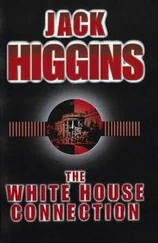Jack Higgins - The Bormann Testament (The Testament of Caspar Schultz)
Здесь есть возможность читать онлайн «Jack Higgins - The Bormann Testament (The Testament of Caspar Schultz)» — ознакомительный отрывок электронной книги совершенно бесплатно, а после прочтения отрывка купить полную версию. В некоторых случаях можно слушать аудио, скачать через торрент в формате fb2 и присутствует краткое содержание. Жанр: Триллер, на английском языке. Описание произведения, (предисловие) а так же отзывы посетителей доступны на портале библиотеки ЛибКат.
- Название:The Bormann Testament (The Testament of Caspar Schultz)
- Автор:
- Жанр:
- Год:неизвестен
- ISBN:нет данных
- Рейтинг книги:5 / 5. Голосов: 1
-
Избранное:Добавить в избранное
- Отзывы:
-
Ваша оценка:
- 100
- 1
- 2
- 3
- 4
- 5
The Bormann Testament (The Testament of Caspar Schultz): краткое содержание, описание и аннотация
Предлагаем к чтению аннотацию, описание, краткое содержание или предисловие (зависит от того, что написал сам автор книги «The Bormann Testament (The Testament of Caspar Schultz)»). Если вы не нашли необходимую информацию о книге — напишите в комментариях, мы постараемся отыскать её.
The Bormann Testament (The Testament of Caspar Schultz) — читать онлайн ознакомительный отрывок
Ниже представлен текст книги, разбитый по страницам. Система сохранения места последней прочитанной страницы, позволяет с удобством читать онлайн бесплатно книгу «The Bormann Testament (The Testament of Caspar Schultz)», без необходимости каждый раз заново искать на чём Вы остановились. Поставьте закладку, и сможете в любой момент перейти на страницу, на которой закончили чтение.
Интервал:
Закладка:
Chavasse frowned. “What do you know about the Bureau?”
“I know it’s a special organization formed to handle the dirtier and more complicated jobs,” Hardt said. “The sort of things MI5 and the Secret Service don’t want to touch.”
“But how did you know I was traveling on this train to meet Muller?” Chavasse said.
“Remember that the arrangement with Muller, by which he was supposed to contact you at Osnabruck, was made through the managing director of the publishing firm. He was naturally supposed to keep the details to himself.”
“Presumably, he didn’t.”
Hardt nodded. “I suppose it was too good a tale to keep from his fellow directors and he told them everything over dinner that same evening. Luckily, one of them happens to be sympathetic to our work and thought we might be interested. He got in touch with our man in London, who passed the information over to me at once. As I was in Hamburg, it was rather short notice, but I managed to get a mid-morning flight to Rotterdam and joined the train there.”
“That still doesn’t explain how the people who killed Muller knew we were supposed to meet on this train,” Chavasse said. “I can’t see how there could possibly have been another leak from the London end. I don’t think it’s very probable that there’s also a Nazi sympathizer on the board of directors of the firm I’m supposed to be representing.”
Hardt shook his head. “As a matter of fact, I’ve got a theory about that. Muller was living in Bremen with a woman called Lilli Pahl. She was pulled out of the Elbe this morning, apparently a suicide case.”
“And you think she was murdered?”
Hardt nodded. “She disappeared from Bremen when Muller did, so they’ve probably been living together. My theory is that the other side knew where he was all along, that they were leaving him alone, hoping he’d lead them to Bormann. I think Muller gave them the slip and left Hamburg for Osnabruck last night. That left them with only one person who probably knew where he had gone and why – Lilli Pahl.”
“I’ll go along with that,” Chavasse said. “It sounds reasonable enough. But it still doesn’t explain why they shot him.”
Hardt shrugged. “Muller could have been carrying the manuscript, but I don’t think that’s very likely. I should imagine the shooting was an accident. Muller probably jumped the person who was waiting for him in your compartment and was killed in the struggle.”
Chavasse frowned, considering everything Hardt had told him. After a while, he said, “There’s still one thing which puzzles me. Muller is dead and that means I’ve come to a dead end as far as finding Bormann goes. I can’t be of any possible use to you, so what made you go to the trouble of saving my skin?”
“You could say I’m sentimental,” Hardt told him. “I have a soft spot for Israeli sympathizers.”
“And how would you know that is what I am?”
“Do you recall a man named Joel ben David?” Hardt asked. “He was an Israeli intelligence agent in Cairo in 1956. You saved his life and enabled him to return to Israel with information which was of great service to our Army during the Sinai campaign.”
“I remember,” Chavasse said. “But I wish you’d forget about it. It could get me into hot water in certain quarters. I wasn’t supposed to be quite so violently partisan at the time.”
“But we Jews do not forget our friends,” Hardt said quietly.
Chavasse was suddenly uncomfortable. “Why are you so keen to get hold of Bormann? He isn’t another Eichmann. There’s bound to be an outcry for an international trial. Even the Russians would want a hand in it.”
Hardt shook his head. “I don’t think so. In any case, we aren’t too happy about the idea of leaving him in Germany for trial, for this reason. There’s a statute of limitations in force under German law. Cases of manslaughter must be tried within fifteen years of the crime – murder, within twenty years.”
Chavasse frowned. “You mean Bormann might not even come to trial?”
Hardt shrugged. “Who knows? Anything might happen.” He got to his feet and paced restlessly across the compartment. “We are not butchers, Chavasse. We don’t intend to lead Bormann to the sacrificial stone with the whole of Jewry shouting hosannas. We want to try him for the same reason we have tried Eichmann. So that his monstrous crimes might be revealed to the world. So that people will not forget how men treat their brothers.”
His eyes sparkled with fire. He was held in the grip of a fervor that seemed almost religious, something that possessed his heart and soul so that all other things were of no importance to him.
“A dedicated man,” Chavasse said softly. “I thought they’d gone out of fashion.”
Hardt paused, one hand raised in the air, and stared at him, and then he laughed and color flooded his face. “I’m sorry, at times I get carried away. But there are worse things for a man to do than something he believes in.”
“How did you come to get mixed up in this sort of thing?” Chavasse asked.
Hardt sat down on the bunk. “My people were German Jews. Luckily, my father had the foresight in 1933 to see what was coming. He moved to England with my mother and me, and he prospered. I was never particularly religious – I don’t think I am now. It was a wild, adolescent impulse which made me leave Cambridge in 1947 and journey to Palestine by way of an illegal immigrants’ boat from Marseilles. I joined Haganah and fought in the first Arab war.”
“And that turned you into a Zionist?”
Hardt smiled and shook his head. “It turned me into an Israeli – there’s a difference, you know. I saw young men dying for a belief; I saw girls who should have been in school, sitting behind machine guns. Until that time, my life hadn’t meant a great deal. After that, it had a sense of purpose.”
Chavasse sighed and offered him a cigarette. “You know, in some ways I think I envy you.”
Hardt looked surprised. “But surely you believe in what you are doing? In your work, your country, its political aims?”
“Do I?” Chavasse shook his head. “I’m not so sure. There are men like me working for every Great Power in the world. I’ve got more in common with my opposite number in the KGB than I have with any normal citizen of my own country. If I’m told to do a thing, I get it done. I don’t ask questions. Men like me live by one code only – the job must come before anything else.” He laughed harshly. “If I’d been born a few years earlier and a German, I’d probably have worked for the Gestapo.”
“Then why did you help Joel ben David in Cairo?” Hardt said. “It hardly fits into the pattern you describe.”
Chavasse shrugged and said carelessly, “That’s my one weakness. I get to like people and sometimes it makes me act unwisely.” Before Hardt could reply, he went on. “By the way, I searched Muller before Steiner arrived on the scene. There were some letters in his inside pocket from this Lilli Pahl you mentioned. The address was a hotel in Gluckstrasse, Hamburg.”
Hardt frowned. “That’s strange. I should have thought he’d have used another name. Did you find anything else?”
“An old photo,” Chavasse said. “Must have been taken during the war. He was wearing a Luftwaffe uniform and standing with his arm around a young girl.”
Hardt look up sharply. “Are you sure about that – that it was a Luftwaffe uniform he was wearing?”
Chavasse nodded. “Quite sure. Why do you ask?”
Hardt shrugged. “It probably isn’t important. I understood he was in the Army, that’s all. My information must have been incorrect.” After a moment of silence, he went on. “This hotel in Gluckstrasse might be worth investigating.”
Читать дальшеИнтервал:
Закладка:
Похожие книги на «The Bormann Testament (The Testament of Caspar Schultz)»
Представляем Вашему вниманию похожие книги на «The Bormann Testament (The Testament of Caspar Schultz)» списком для выбора. Мы отобрали схожую по названию и смыслу литературу в надежде предоставить читателям больше вариантов отыскать новые, интересные, ещё непрочитанные произведения.
Обсуждение, отзывы о книге «The Bormann Testament (The Testament of Caspar Schultz)» и просто собственные мнения читателей. Оставьте ваши комментарии, напишите, что Вы думаете о произведении, его смысле или главных героях. Укажите что конкретно понравилось, а что нет, и почему Вы так считаете.












